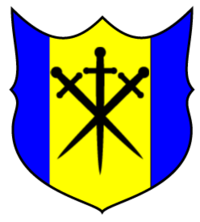Royal Delkoran Armed Forces: Difference between revisions
No edit summary |
No edit summary |
||
| Line 39: | Line 39: | ||
|percent_GDP = 1.5% | |percent_GDP = 1.5% | ||
<!-- Industrial --> | <!-- Industrial --> | ||
|domestic_suppliers = Banforth-Galderok Group<br> Royal Crown Armory<br>Tordenhelm Arms<br> | |domestic_suppliers = Banforth-Galderok Group<br> Royal Crown Armory<br>Tordenhelm Arms<br>Fjodonor Metall | ||
|foreign_suppliers = | |foreign_suppliers = | ||
|imports = | |imports = | ||
Revision as of 22:53, 7 June 2019
| Royal Delkoran Armed Forces | |
|---|---|
| Raikalet Delkorsk Armetstryken | |
 | |
| Founded | 1385 |
| Service branches | Royal Delkoran Army Royal Delkoran Navy Royal Delkoran Air Force Home Guard |
| Headquarters | Ministry of Defense, Norenstal |
| Leadership | |
| Monarch | Haldor VII |
| Minister of Defense | Felgar Dendryr |
| Chair of the Defense Council | Admiral Kastien Tydenvard |
| Manpower | |
| Military age | 17 |
| Conscription | Yes, male and female (suspended) |
| Active personnel | 450,000 |
| Reserve personnel | 835,000 |
| Expenditures | |
| Budget | 74.8 billion NSD (FY 2018) |
| Percent of GDP | 1.5% |
| Industry | |
| Domestic suppliers | Banforth-Galderok Group Royal Crown Armory Tordenhelm Arms Fjodonor Metall |
| Related articles | |
| History | Delkoran Civil War Nalayan Civil War Raithir Island Affair |
The Royal Delkoran Armed Forces are the armed forces of the Kingdom of Delkora, responsible for defending the Kingdom and its territory. It is comprised of four service branches: the Royal Army, Navy, Air Force, and Home Guard. Members of each branch swear an oath of loyalty to the Constitution of Delkora.
Service branches
Royal Army
The Delkoran Army has a total of 325,045 active personnel and 480,000 reserve personnel.
The Delkoran Navy has a total of 50,360 active personnel and 105,350 reserve personnel. It fields a total of 149 combat vessels, including 2 Illyar-class light aircraft carriers, 7 destroyers, 15 frigates, 72 corvettes, 37 submarines, and 16 coastal patrol craft. In addition to its surface fleet, the Delkoran Navy also operates a total of 78 naval aircraft.
Royal Air Force
The Delkoran Air Force has a total of 25,745 active personnel and 50,800 reserve personnel.
Home Guard
In addition to the three primary branches of its armed forces and their associated reserve components, Delkora maintains a separate reserve force known as the Home Guard that is administered by each of its five states. The total manpower of the Home Guard is around 200,000. These forces exist primarily to protect civilians and strategic infrastructure in the event of an invasion, as well as engage in guerrilla warfare and sabotage against enemy forces. In peacetime they are often used to supplement civil authorities in responding to natural disasters. Although normally under the command of their respective state governments, Home Guard units can be called into the service of the federal government in national emergencies.
Special Forces
Each of the Kingdom's three primary service branches has an associated special forces element specializing in, among other things, counter-terrorism operations, hostage rescue, covert warfare, reconnaissance, and unconventional warfare. These include the Army's Special Assault Force (SAF), the Air Force's Royal Air Guard (RAG), and the Navy's Amphibious Commando Element (AKE).
Conscription
For much of its history, the Royal Delkoran Armed Forces relied heavily on conscription. A shift started to occur during the chancellorship of Alduin Laeroth from 1888 to 1900. Led by Laeroth, the Conservative Party had campaigned on a platform of strengthening Delkora's position in international affairs, which necessitated the transition toward a fully professional military. Although the draft was kept in place, Laeroth and later Ragnar Tybengaard focused on increasing recruitment for the standing army. In 1932, the Liberal-National Labor coalition government of Yaslara Olgrev suspended conscription, only for it to be reinstated by her Conservative successor, Valdrius Albendor. During the National Labor chancellorship of Mette Elvensar in the early 1960's, a number of sweeping military reforms were implemented, including allowing women to serve in combat roles for the first time and making them subject to conscription. Elvensar also instituted an exception for conscientious objectors.
Conscription remained in place until being suspended by Chancellor Kol Vossgaard in 2004. Today, all able-bodied Delkoran citizens of both sexes are required to register with the Ministry of Defense within 30 days of their 17th birthday, and are eligible to be called up for service until the age of 35. Conscription can be reinstated at any time by decree of the chancellor, the minister of defense, or a vote of the Federal Parliament. The draft is a highly controversial topic in Delkoran politics, with a variety of competing views on the issue. The Liberal Party generally opposes it on civil liberty grounds, while National Labor and the Greens object to the "militarization" of society and the draft's history of disproportionately recruiting from low-income and marginalized communities. The Conservative Party, by contrast, mostly supports the draft, and often claims that conscription helps to foster a sense of civic duty and patriotism. The Agrarian Party touts conscription as a preferable alternative to a large standing army, holding that a citizen army is more democratically accountable and less likely to be wielded against the people by a corrupt government.